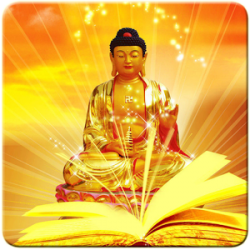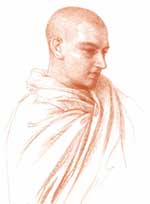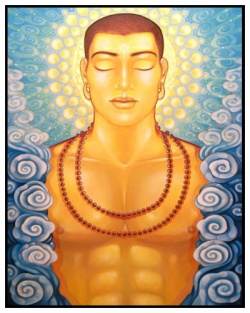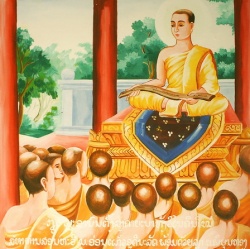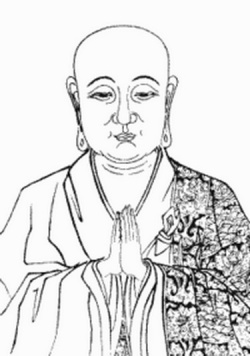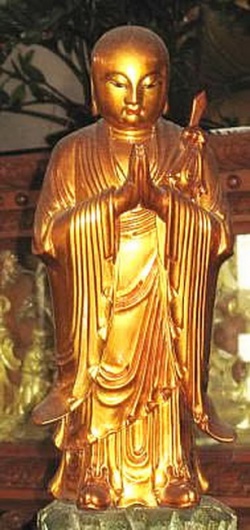Ananda
Ananda was the son of the Buddha’s uncle Amitodana, he was for many years the Buddha’s personal attendant and was also the most widely loved of all his disciples. If Sariputta personified wisdom and Moggallana personified psychic ability, then Ananda certainly personified kindness, gentleness, warmth and love. The Buddha praised him for his ‘acts of love through body, through speech and through mind’ (Digha Nikaya 2. 144), meaning that he was always ready to lend a helping hand, that he always spoke kindly to people and that he always thought well of others. The Buddha even said that he shared some of the very qualities that he himself had - that people were delighted to see him, that they delighted when he taught the Dhamma and they were disappointed when he finished speaking (Digha Nikaya 2. 145).
Ananda had a crucial role in the First Buddhist council. Having spent so many years close to the Buddha and remembering many of his discourses, he recited them during the council so that the other participants could commit them to memory and pass them down. It is with Ananda's words, Evaṃ me sutaṃ..., ‘Thus have I heard…’ that most suttas begin with.
Source
Ānanda was one of many principal disciples and a devout attendant of The Buddha. Amongst The Buddha's many disciples, ĀNanda had the most retentive memory and most of the suttas in the Sutta Pitaka are attributed to his recollection of The Buddha's teachings during the First Buddhist Council. For that, he was known as the Guardian of the Dharma. According to The Buddha every Buddha in the past and to come will have two chief disciples and one attendant during his ministry. In the case of Gautama Buddha the pair of disciples were Sariputta and Mahamoggallana and the attendant ĀNanda. The word 'ĀNanda' means 'bliss' in Pali, Sanskrit as well as other Indian languages. It is a popular Buddhist and Hindu name. In MN 90, Kannakatthala Sutta, Ananda is identified with the meaning of his name:
- Then King Pasenadi Kosala said to the Blessed One, "Lord, what is the name of this Monk?"
- "His name is Ananda (Joy), great king."
- "What a Joy he is! What a true Joy!..."
ĀNanda was the first cousin of The Buddha by their fathers, and was devoted to him. In the twentieth year of The Buddha's ministry, he became The Buddha's personal attendant, accompanying him on most of his wanderings and taking the part of interlocutor in many of the recorded dialogues. He is the subject of a special panegyric delivered by The Buddha just before The Buddha's Parinibbana (the Mahaparinibbana Sutta (Digha Nikaya 16)); it is a panegyric for a man who is kindly, unselfish, popular, and thoughtful toward others. In the long list of the disciples given in the Anguttara Nikaya (i. xiv.) where each of them is declared to be the chief in some quality, ĀNanda is mentioned five times (more often than any other). He was named chief in conduct, in service to others, and in Power of memory. The Buddha sometimes asked him to substitute for him as teacher and then later stated that he himself would not have presented the teachings in any other way.
The First Council
Because he attended The Buddha personally and often traveled with him, ĀNanda overheard and memorized many of the discourses The Buddha delivered to various audiences. Therefore, he is often called the Disciple of The Buddha who "heard much". At the First Buddhist Council, convened shortly after The Buddha died, Ananda was called upon to recite many of the discourses that later became the Sutta Pitaka of the Pāli Canon. Despite his long association with and close proximity to The Buddha, Ananda was only a stream-winner prior to The Buddha’s Death. However, Buddha said that the purity of his Heart was so great that, "Should Ananda die without being fully liberated; he would be king of the Gods seven times because of the purity of his Heart, or be king of the Indian subcontinent seven times. But Udayi, Ananda will experience final Liberation in this very Life." Prior to the First Buddhist Council, it was proposed that Ananda not be permitted to attend on the grounds that he was not yet an Arahant. According to legend, this prompted Ananda to focus his efforts on the attainment of Nibbana and he was able to reach the specified level of attainment before the calling of the conclave. In contrast to most of the figures depicted in the Pāli Canon, Ananda is presented as an imperfect, if sympathetic, figure. He mourns the deaths of both Sariputta, with whom he enjoyed a close Friendship, and The Buddha. A verse of the Theragatha reveals his loneliness and isolation following the Parinirvana of The Buddha. In the Zen tradition, Ananda is considered to be the second Indian Patriarch. He is often depicted with The Buddha alongside Mahakashyapa, the first Indian Patriarch.
Source
Ānanda. (T. Kun dga’ bo; C. Anantuo; J. Ananda; K. Ananda [[[阿難]][陀]). In Sanskrit and Pāli, literally “Bliss,” the name of the Buddha’s cousin, longtime attendant, and one of his chief disciples.
According to tradition, in his previous life, he was a god in the Tuṣita heaven, who was born on the same day and into the same Śākya clan as the Bodhisattva and future buddha who was born as prince Siddhārtha. Ānanda was born as the son of Amṛtodana, the brother of king Śuddhodana. He was thus the Buddha’s cousin and the brother of Devadatta. When the Buddha returned to his home town of Kapilāvastu in the second year after his enlightenment, many of the Śākyan men, such as Ānanda and Devadatta, wished to renounce the householder life and become the Buddha’s disciples as monks. Not long after his ordination, Ānanda became a Srotaāpanna upon hearing a sermon by Pūrṇa. The Buddha did not have a personal attendant for the first twenty years after his enlightenment, with various monks occasionally offering various services to him. But after two decades of these ad hoc arrangements, the Buddha finally asked for someone to volunteer to be his personal attendant; all the monks volunteered except Ānanda, who said that he did not do so because the Buddha would choose the correct person regardless of who volunteered. The Buddha selected Ānanda, who accepted on the following conditions: the Buddha was never to give him any special food or robes that he had received as gifts; the Buddha was not to provide him with a special monk’s cell; and the Buddha was not to include him in dining invitations he received from the laity. Ānanda made these conditions in order to prevent anyone from claiming that he received special treatment because of serving as the Buddha’s attendant. In addition, he asked to be allowed to accept invitations on behalf of the Buddha; he asked to be allowed to bring to the Buddha those who came from great distances to see him; he asked to be able to bring any questions he had to the Buddha; and he asked that the Buddha repeat to him any doctrine that had been taught in his absence.
Ānanda saw these latter conditions as the true advantages of serving the Buddha. For the next twenty-five years, Ānanda served the Buddha with great devotion, bringing him water, sweeping his cell, washing his feet, rubbing his body, sewing his robes, and accompanying him wherever he went. He guarded the Buddha’s cell at night, carrying a staff and a torch, in order to make sure that his sleep was not disturbed and to be ready should the Buddha need him. As the Buddha grew older and more infirm, Ānanda provided devoted care, despite the fact that the two were exactly the same age. Because Ānanda was constantly in the Buddha’s presence, he played a key role in many famous events of the early dispensation. For example, it was Ānanda who, on behalf of Mahāprajāpati, requested that women be allowed to enter the Saṃgha as nuns, persisting in his request despite the Buddha’s initial refusal. He is therefore remembered especially fondly by the order of Bhikṣuṇīs, and it is said that he often preached to nuns. In a famous tale reproduced in various sources, the daughter of a woman named Mātaṅgī attempted to seduce Ānanda with the help of her mother’s magical powers, only to come to realize her wrongdoing with the intervention of the Buddha. Toward the end of his life, the Buddha mentioned to Ānanda that a buddha could live for a Kalpa or until the end of the kalpa if he were asked to do so. (See Cāpālacaitya.)
Ānanda, distracted by Māra, failed to request the Buddha to do so, despite the Buddha mentioning this three times. Ānanda was chastised for this blunder at the first council (see infra). Ānanda figures prominently in the account of the Buddha’s last days in the Mahāparinibbānasutta, weeping at the knowledge that the Buddha was about to die and being consoled by him. Ānanda was known for his extraordinary powers of memory; he is said to have heard all 84,000 sermon topics (82,000 taught by the Buddha and 2,000 taught by other disciples) and was able to memorize 15,000 stanzas without omitting a syllable. He therefore played a key role in the recitation of the Buddha’s teachings at the first council (Saṃgīti; see First Council) held at Rājagṛha shortly after the Buddha’s death. However, Mahākāśyapa, who convened the council, specified that all five hundred monks in attendance must be Arhats, and Ānanda was not.
On the night before the opening of the council, Ānanda achieved the enlightenment of an arhat as he was lying down to sleep, as his head fell to the pillow and his feet rose from the ground. He is therefore famous for achieving enlightenment in none of the four traditional postures (Īryāpatha): walking, standing, sitting, or lying down. As an arhat, Ānanda was welcomed to the council, where he recounted all the words of the Buddha (except those concerning the Vinaya, or monastic rules, which were recited by Upāli). For this reason, most Sūtras open with the words, “Thus have I heard” (Evaṃ Mayā Śrutam); the “I” is usually Ānanda. (For this reason, Ānanda is also known in China as Duowen Diyi, “First in Vast Hearing” or “He Who Heard the Most.”) After the Buddha’s death, the order of monks brought five charges against Ānanda: (1) the Buddha had said that after his passing, the monks could disregard the minor precepts, but Ānanda failed to ask him which those were; thus, all the precepts had to be followed; (2) Ānanda had once stepped on the Buddha’s robe when sewing it; (3) Ānanda had allowed women to honor the Buddha’s naked body after his death and their tears had fallen on his feet; (4) Ānanda failed to ask the Buddha to live on for the rest of the kalpa; and (5) Ānanda urged the Buddha to admit women to the order. Ānanda replied that he saw no fault in any of these deeds but agreed to confess them. According to Faxian, when Ānanda was 120 years old, he set out from Magadha to Vaiśālī in order to die.
Seeking his relics (Śarīra), Ajātaśatru followed him to the Rohīni River, while a group from Vaiśālī awaited him on the other bank. Not wishing to disappoint either group, Ānanda levitated to the middle of the river in the meditative posture, preached the dharma, and then meditated on the Tejokasiṇa, which prompted his body to burst into flames, with the relics dividing into two parts, one landing on each bank of the river. Ānanda has long been one of the most beloved figures in the history of Buddhism, in part because he was not the wisest of the Buddha’s disciples but showed unstinting devotion to the Buddha, always seeking to understand him correctly and to bring his teachings to as many people as possible.
Source
The Princeton Dictionary of Buddhism by Robert E. Buswell Jr. and Donald S. Lopez Jr.
Ananda (Skt. Ānanda; Tib. ཀུན་དགའ་བོ་, Wyl. kun dga' bo) — the Buddha's cousin who later became his attendant. He remembered all the sutra teachings of the Buddha and recited them at the first council (See Three Buddhist Councils). He was the second of the seven patriarchs. He was also Nanda's elder brother.
Source
The Buddha's personal attendant, who recited the Sutras at the First Council and served as second patriarch
personal attendant and cousin of buddha
Ananda. One of the ten close disciples of the Buddha; the Buddha's personal attendant, who recited the sutras at the First Council and served as the second patriarch in the oral transmission of the Dharma
Source
Ananda (fifth century BCE) was the Buddha's cousin and personal attendant for twenty-four years. After the Buddha's death, at the First Council of Arhats held at Rajagrha, Ananda, having total recall, was instrumental in the codification of the oral traditions that preserved the lectures and teachings that he had witnessed as the Buddha's attendant. At that time he recited the entire sutra section of the hinayana Tripitaka from memory. Because he devoted his time to attending to the Buddha and did not practice what the Buddha taught, he only attained arhatship after the passing away of the Buddha, just before the commencement of the First Council. His current incarnation is Nyingma Dharma King Renqing Rongbo Barongbo Rinoche.

